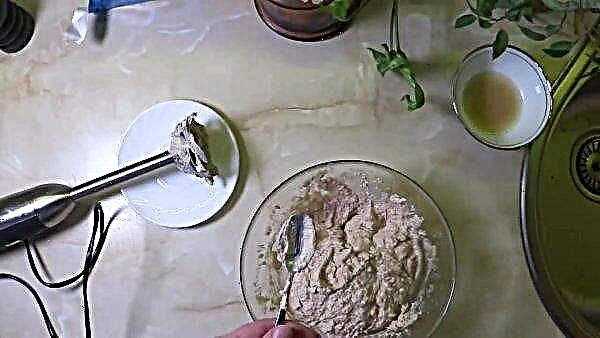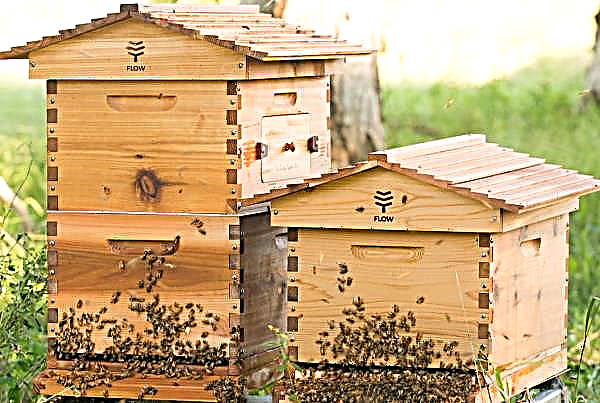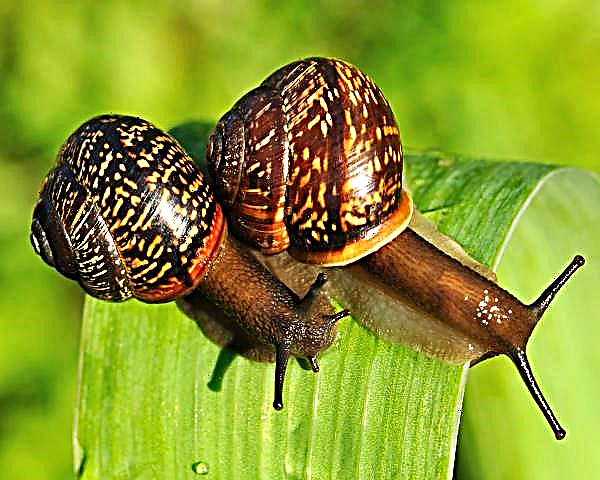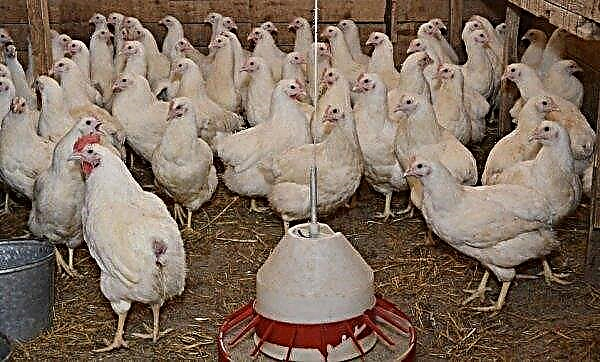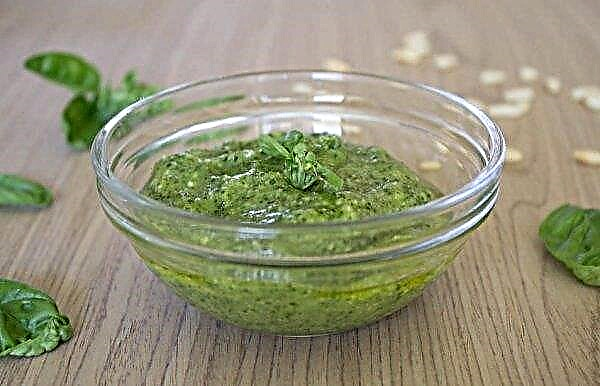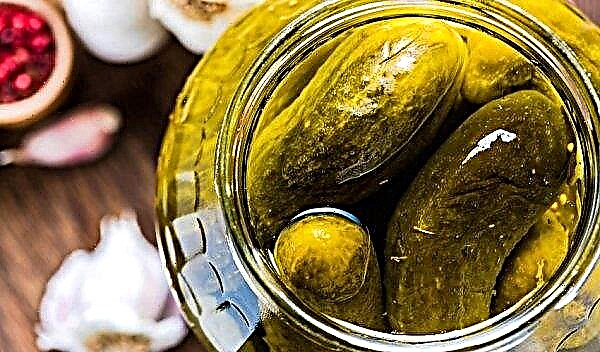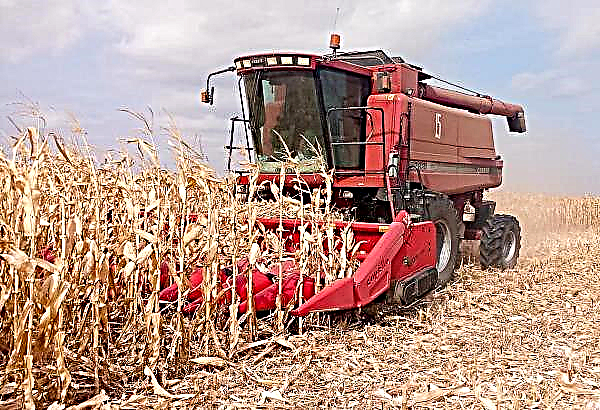Onions, as you know, have a huge amount of useful properties and are even considered one of the most powerful natural antibiotics. However, the diet during pregnancy has many features and limitations, so expectant mothers often have doubts about the permissibility of eating vegetables and fruits during this period, even familiar to the area. Whether the onion is compatible with the diet of a pregnant woman, in what form and in what quantities it is better to eat and what needs to be done so that the product benefits the child and not the harm - all this will be discussed in this review.
Can onions be pregnant
The question of the permissible use of onions during pregnancy arises quite reasonably, because, on the one hand, it is a natural plant product containing a huge amount of vitamins and other valuable elements, but on the other hand, it refers to spicy foods, which, as you know, are contraindicated for future mothers . To get an unambiguous answer, you should first of all take an interest in the chemical composition of the vegetable and thus determine what is still more beneficial or harmful.
Did you know? It is estimated that the genus Allium (the Latin name for onions) includes more than a thousand species, while about a quarter of them are edible, including Allium sativum, better known as ... garlic.
In Eastern Europe, the most popular is onion, used in two types - onions (turnips) and feathers (green onions), so they should be considered separately.
Green
Biologically active substances make up only seven percent of the composition of this product (everything else is ordinary water), but even such a tiny fraction puts green onions on the first steps in the top of the most healthy products.
So, green feathers are very rich in vitamins.
For a pregnant woman, it is important to know what is here:
- vitamin Cstrengthening immunity, promoting the absorption of iron, uplifting, stabilizing hormonal balance, reducing the likelihood of bleeding during childbirth and preventing the appearance of stretch marks after the birth of a child;
- folic acid, preventing the so-called defect in the development of the neural tube of the fetus and therefore critically necessary for the expectant mother, especially in the first trimester of pregnancy;
- vitamin Aplaying a crucial role in cell growth processes;
- vitamin enecessary for the proper formation of the baby’s nervous system;
- vitamin PPthat improves blood circulation and helps to avoid fetoplacental insufficiency (inability of the placenta to provide adequate nutrition to the fetus);
- riboflavininvolved in the formation of bones, muscles, as well as the baby’s nervous system;
- vitamin b1responsible, inter alia, for the development of the nervous and muscular systems, as well as for the work of the heart;
- vitamin kthat provides blood coagulation processes and strengthens bone tissue.
Important! Carotene and vitamin K are absent in onions, but are in green. Another advantage of the pen over turnip is the presence of manganese in it, which is also responsible for the formation of bone and cartilage.
In addition to manganese, feathers contain such important minerals for the future mother as calcium, phosphorus, potassium, magnesium, iron, cobalt, copper, iodine, zinc, etc.
Onion
Despite the fact that chives and onions are actually one and the same plant, just in one case we are talking about its above-ground part, and in the second - about the underground (so to speak, tops and roots), chemical composition, and therefore , and the valuable properties of these products are still somewhat different.
In general, it should be noted that the most important and valuable vitamins, as well as mineral elements in the bulb are still much less than in the feather. This, in particular, applies to ascorbic acid, cobalt (promotes the absorption of iron, participates in hematopoiesis), molybdenum (provides oxygen metabolism, prevents the development of anemia).
But, despite the foregoing, the bulb is useful enough to take its place of honor in the diet of the expectant mother. So, bulbs, like feathers, contain a number of amino acids, including essential ones (valine, histidine, leucine and isoleucine, methionine, tryptophan, lysine, threonine, phenylalanine), organic acids, as well as flavonoid glycosides, among which kempferol is worth highlighting .
It is also worth mentioning that in onion there is one very important component that is not in the feather. This substance is called allicin, it is it that gives the bulb a characteristic sharp taste. Allicin, in addition to pronounced bactericidal and fungicidal (antifungal) properties, has, as it turned out, also anti-cancer activity, in connection with which it is even used for the manufacture of drugs that are included in the therapeutic course for various oncological diseases.
Did you know? Onions belong to those products whose valuable properties have never been underestimated. So, for example, during the time of the Crusades, Christian missionaries offered the Arabs eight bulbs for every European they captured, and the Saracens willingly agreed to such an exchange.
The benefits and harms of use during pregnancy
- Modern medicine claims that the use of onions during pregnancy to some extent provides:
- prevention of premature termination of pregnancy in all its periods, as well as bleeding during childbirth and the postpartum period;
- restoration of hormonal balance and quick adjustment of the menstrual cycle at the end of pregnancy;
- protection of mother and baby from infectious diseases - both bacterial and viral in nature;
- reduction of prenatal and postpartum depression, protection from insomnia, feelings of anxiety, depression and other manifestations of psychological or mental discomfort;
- lowering blood cholesterol, strengthening the walls of blood vessels;
- prevention of anemia and other painful conditions caused by iron deficiency;
- improving the work of the heart, liver, kidneys, as well as vision;
- analgesic effect in case of pain syndromes of different nature (headache, toothache, muscle pain, etc.).
In addition, many of the components that make up onions are vital at different stages of pregnancy for the proper formation of all organs and systems of the fetus.

For all its value, eating onions can cause a future mom certain troubles.
- In particular, you need to remember that this vegetable has the property:
- irritating effect on the nervous system, which can provoke increased excitability and insomnia;
- provoke increased gas formation in the intestine;
- increase blood pressure and cause arrhythmia;
- cause heartburn.
All of these conditions for a woman preparing to become a mother are extremely undesirable, and therefore, when compiling your diet, you always need to remember the “reverse side of the coin” that any product, even the most useful, has.
Did you know? Onion allergies often occur in people sensitive to birch pollen. This is an example of the so-called cross-allergic reaction when an organism that is susceptible to one stimulus, in this case a respiratory one, “confuses” it with another substance that is similar in structure or amino acid composition.
Possible contraindications
There are no contraindications to the use of onions, which would be directly related to pregnancy, by medicine. In some sources, however, one can come across a warning that in the later stages this product should not be abused, since the baby in this case may be born with a predisposition to allergies. However, the existence of such a dependence does not find any scientific evidence.
It has been established that onion has a very low allergenic activity - moreover, one of the non-standard methods of treating allergies is to use this product in high quantities (onion diet). It turns out that the quercetin contained in the vegetable blocks the release of histamine, the most active substance secreted by the immune cells when the body comes in contact with the allergen and causes specific allergy symptoms: rash, runny nose, tearing, etc.

However, there are conditions in which a product that is useful but contains many acids, glycosides, and other very active nutrients can, especially if used improperly, lead to a serious deterioration in the general condition.
- In particular, the expectant mother should be very careful about eating onions, regardless of their type and method of preparation, if she suffers:
- disorders of the gastrointestinal tract, in particular, pancreatitis, ulcer or gastritis against the background of increased acidity;
- chronic or acute liver disease;
- gallstone disease;
- arterial hypertension;
- bronchial asthma.
Application methods
Like the vast majority of vegetables (the exception, perhaps, is only beets and potatoes), onions are best consumed fresh, since a significant part of its valuable substances lose their properties in the process of heat treatment. Therefore, the simplest and most correct solution is to add green or onion to the salad, or eat a few feathers in the bite with the main course. Fish, meat, soup or scrambled eggs will become much tastier if you sprinkle them with finely chopped green onions before serving.
Another possible way to use the product is baking. Baked onion loses its pungent taste, does not irritate the gastric mucosa and does not cause halitosis. Of course, the vitamin composition of the vegetable after baking is somewhat reduced, but a rather large amount of valuable nutrients in it is still preserved.
The same can be said about stewing (fries, stews and other stews with onions in the future mother’s diet are not only acceptable, but also desirable), as well as cooking, although objectively speaking, the appearance and taste of boiled onions in most people is real disgust, so such a “delicacy” in the diet during pregnancy is not ready to include all.

Things are a little different with fried onions. And the point here is not in the vegetable itself, but in the method of heat treatment. The fact is that with strong heating, the oil on which the product is fried begins to secrete aldehydes belonging to the class of carcinogens, that is, substances that are very dangerous to health and provoke the development of malignant neoplasms in the body.
Important! The lower the oxidation temperature of vegetable oil, the less suitable it is for frying. So, for example, in unrefined olive oil, this indicator is + 242 ° С, in sunflower and corn oil + 232 ° С, but in mustard - + 254 ° С.
During pregnancy, it is also worth abandoning the use of pickled onions, if the basis for the marinade is synthetic table vinegar. This component helps to reduce hemoglobin in the blood, and anemia, as you know, is a very common and extremely dangerous condition during pregnancy. In addition, vinegar “dries”, that is, causes a strong thirst, quenching which, the expectant mother loads the kidneys, which already work in a regime close to extreme. And since there is nothing useful in vinegar, a similar method of processing products for the diet of pregnant women is completely unsuitable.
Speaking about the methods of eating onions, one more thing should be mentioned. It has long been believed that the peeled pulp of this vegetable has a certain magical property to absorb all the negative from the environment. Some people sincerely believe that if you put the chopped onion in the room where the sick person is, then after some time the patient’s condition will improve, since the microbes and viruses that caused the disease will migrate from the human body into a vegetable.
For this reason, in many sources you can find a warning that onions should be eaten immediately after cleaning, otherwise it literally turns into poison. The scientific validity of this statement raises some doubts, but, on the other hand, pregnancy is a bad time to conduct experiments on yourself, so before a baby is born, a woman should make it a rule to peel the onion immediately before use.
Precautionary measures
The use of onions during pregnancy cannot cause direct harm to the baby, so that in this regard, the expectant mother can be absolutely calm. However, excessive enthusiasm for a product with high biological activity may be unsafe for the woman herself, especially if she has certain chronic diseases or is predisposed to them (pregnancy is a big burden for the body, therefore in this state all hidden problems very often manifest or worsen health).
It is from this point of view that the expectant mother should be careful with products like onions. In addition, any serious deterioration in her condition indirectly negatively affects the baby.
Important! The best way not to make a mistake with the dosage when consuming ambiguous products is to listen carefully to yourself.
If the appearance or smell of onions causes disgust in a pregnant woman, then you need to forget about all the useful qualities of this product and switch to eating other vegetables. But those future mothers who, looking at a salad generously flavored with onion rings or green feathers, feel active salivation, and after eating such a dish do not experience any unpleasant sensations, there can be no doubt that they and the kids will only benefit from the onion eaten.
Onions are definitely not included in the list of products prohibited for use during pregnancy. Moreover, in this vegetable there is a huge amount of nutrients vital for both the expectant mother and the baby developing inside her. If you take basic care, carefully monitor your well-being and maintain a healthy sense of proportion, then any onion - green and onion, red and white, as well as leek, shallots, batun and all other exotic types of this vegetable - you can safely eat a pregnant woman, not fearing neither for themselves nor for the child.

